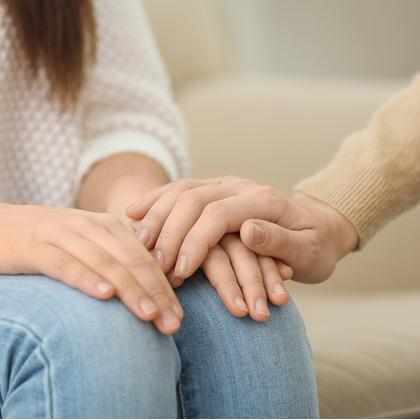
The latest figures suggest just over 6,500 people die by suicide every year in the UK, with around 800,000 global deaths caused annually by suicide (i). In this country, men are far more likely to die by suicide than women – 76 per cent of suicides are by men, and suicide is the biggest cause of death for men under 35 says the Men’s Health Forum (ii).
Many people – male and female – have thoughts of suicide at some point in their lives. According to the mental health charity Mind these can be abstract thoughts about ending your life, feeling that people would be better off without you, thinking about the ways in which you could end your life or making clear plans to do so (iii).
There’s no one single reason why people contemplate suicide. Each individual has a different experience when it comes to suicidal feelings. They can change from one moment to another or mount up over time. They can last momentarily, or they may linger, making you feel as if you’ll never feel happy again. There’s also no single reason why anyone has suicidal feelings, in fact you may not even know why you’re having them.
As well as having feelings of sadness and hopelessness, you may experience other things too, such as:
Loss of appetite (either eating more or less, which can lead you to gain or lose weight)
-
Sleep difficulties
-
Low self-esteem
-
Lack of interest in your physical appearance
-
Wanting to be on your own and avoid other people
-
Thoughts of self-harming
Suicidal feelings can be frightening. But according to Mind, most people who have them go on to live fulfilling lives (iii).
How to help yourself
If you are having suicidal feelings, your GP can help by referring you to a therapist or your community mental health team, or if necessary prescribe you medication. Self-care can also play a major role in helping you cope with suicidal feelings. Here are some of the things you could do to look after yourself:
Concentrate on the small picture
When you find yourself thinking about suicide, don’t worry about what’s going to happen in the future, just focus on getting through today. Go somewhere you feel safe and supported, such as a friend’s house or somewhere you can be around other people. And if you’ve had suicidal thoughts before, remind yourself that they went away in time.
Avoid drugs and alcohol
When you feel down it’s sometimes tempting to turn to things that you think will help you cope with your emotions, such as drugs and alcohol. But while they may offer a brief, temporary distraction, these things can make you feel even worse in the long run, especially if you become dependent on them to make you feel good.
If you need help with avoiding drugs or alcohol, there are self-help groups that could offer the support you need, such as Alcoholics Anonymous (AA) and Narcotics Anonymous (NA). You could also speak to your GP to find out if counselling or medication may help you.
Follow a healthy lifestyle
Eating healthily is often believed to be as important for maintaining your mental health as it is for protecting against physical health problems. So try to avoid junk food, even if it’s all you feel like eating. Have regular meals every day made from natural healthy ingredients, and try not to skip breakfast or other meals.
It’s also important to stay physically active, as exercise encourages the release of chemicals called endorphins that can help to lift your mood. Try something simple such as walking or going for a swim, both of which may also help you sleep better.
Start a diary
Many people find it helps to write down their thoughts and feelings in a journal or diary. If you’re creative, you may also want to try expressing your feelings by drawing, painting or some other artistic format.
Remember to write about or express positive things rather than just negative experiences or feelings, including the little everyday things that help you feel better.
Use distractions
Doing something that you enjoy could help take your mind off how you’re feeling. You could, for instance:
-
Phone a good friend
-
Read your favourite book
-
Listen to music
-
Feed the birds in your garden
-
Visit an art gallery or museum
-
Sing your favourite songs
-
Bake some bread or a cake
-
Play some video games or do some puzzles
Take a trip down memory lane
When you’re in a good mood, try filling a box with items that may help lift your mood and comfort you when you’re having negative thoughts. Things you could put in your box include music that makes you feel good, photos of family members and friends, photos you places where you’ve felt happy, letters, books, childhood toys – indeed anything that makes you remember the good things in life.
Stay connected
Social isolation is thought to be a significant risk factor for suicide. So even when you feel like closing your front door and hiding from the world, it’s important to stay as connected to others as much as possible. Try reaching out to a friend or family member who you trust, and consider telling them about how you feel.
Alternatively you could try joining a support group in your area – for instance, Mind has a network of around 125 local groups across England and Wales.
You could also consider joining an online forum in order to keep in touch with other people who may know what you’re going through, such as Elefriends and the support forum run by Sane? You may also want to take a look at Big White Wall, an online community of people who support and help each other and who are guided by trained professionals, or CALM (Campaign Against Living Miserably), which is a support group for young men.
Call someone who can help
If you don’t want to talk to your GP or people you know about the way you feel there are trained people you can talk to instead – see the section below: Where to get further help. Then make a note of any numbers you think may be helpful and put them somewhere safe, so you don’t have to worry about looking them up if you’re not thinking straight.
You could also try practising mindfulness, which may be helpful if you’re feeling stressed out about anything. Find out how by reading our guide to using mindfulness to manage stress.
How to help someone else
There are many signs that may suggest someone is having suicidal thoughts. For instance they may be anxious or irritable, or they may be having mood swings or start finding it hard to cope with everyday things.
Some people can withdraw into themselves, wanting to be on their own more and avoiding the company of other people such as friends and families, and ignoring or not replying to messages. Or they may start saying a lot of negative things about themselves, make jokes about their emotions or even seem far more cheerful than usual, which you may think seems fake.
There are also lots of situations that may trigger suicidal thoughts in any of us. If someone you know is having relationship or family problems, for instance, or has had a relationship break-up or bereavement, they may be feeling particularly low. Other things that can trigger suicidal thoughts include having financial, job or study-related difficulties, feelings of isolation, having a physical illness (especially one that causes pain) and using alcohol or drugs heavily.
If you suspect someone you know may be having suicidal thoughts, don’t ignore your gut instincts. One of the best ways you can help them is to be a good listener for them. Try to encourage them to open up about their feelings – ask them open questions (that is, questions that provoke more than a ‘yes’ or ‘no’ response), such as ‘How are you feeling?’, or ‘How do you feel about…?’.
Here are a few other suggestions that could help you to help them:
Find an appropriate time and place
When you approach the subject with them, choose somewhere the other person will feel comfortable and at a time they can talk without distractions.
Find out how they feel
If the person you’re talking to just tells you the facts of what’s happening and why, remember to ask them how they feel about it too. Being invited to reveal their feelings could be a big relief – and you may find out more about what they’re really worried about.
Don’t push them
It’s natural to want to help people who are suffering and give them advice. But if they don’t want help, try not to put any pressure on them. Encourage them to think of their options, but let them decide what they want to do. Just let them know that they’re not alone, and try to be there for them in other ways instead, such as giving them help with practical issues. It’s also a good idea to remind them that they won’t always feel like this.
Look after yourself too
Talking to others about their problems and worries can also have an effect on you. So when you’re trying to help someone, make sure you make time for yourself to do the things you like doing, and if necessary find someone you can confide in. Try to avoid taking other people’s problems to heart so much that you start feeling down yourself too.
Meanwhile if you’re worried that someone may be at immediate risk of taking their life, stay with them and ring their GP for an emergency appointment, ring NHS 111 or take them to their nearest A&E department (or ring 999 for an ambulance). If they are already being supported by a Community Mental Health Team, get them to call their nurse or care co-ordinator.
Where to get further help
Whether you’re having suicidal thoughts yourself or you’re trying to help someone you’re worried about, besides your GP there are lots of sources of help available:
Samaritans
Every six seconds Samaritans answers a call for help. Call them on 116 123 any day, any time. If you prefer to express your feelings in writing, email jo@samaritans.org. You can also use the charity’s self-help app to track your mood and find practical suggestions to help you look after your emotional health.
Campaign Against Living Miserably
CALM is a campaign against suicide and provides support for anyone who needs it. Call 0800 58 58 58 or visit thecalmzone.net. It also has a webchat service at thecalmzone.net/help/webchat.
PAPYRUS
This voluntary organisation aims to support young people (under 35) thinking about suicide and those who are concerned about a young person. Call 0800 068 41 41 or visit papyrus-uk.org.
Students Against Depression
If you’re a student who needs to find a way forward from suicidal thinking, stress, low mood or depression, Students Against Depression offers resources that may be helpful (studentsagainstdepression.org).
Rethink Mental Illness
This charity offers factsheets on a number of topics, including how to cope with suicidal thoughts as well as how to support someone with suicidal thoughts. It also has a factsheet on crisis resolution teams, which may also be helpful for those with suicidal thoughts who have previously been diagnosed with a mental illness.
SANE
The SANE mental health supports people who need help with the full spectrum of mental illness, from anxiety and depression to eating disorders, self-harm and suicide. Visit sane.org.uk to find out more.
Switchboard
A LGBT+ helpline, this is open from 10am to 10pm every day. Call on 0300 300 0630. Alteratively you can chat via the website (switchboard.lgbt) or email chris@switchboard.lgbt.
Childline
Children and young people can also call Childline on 0800 1111 (the number won’t show up on the phone bill).
Natural support for low mood
If you’re experiencing low mood or depression there are several nutritional supplements that may give you that extra bit of support:
St John’s wort
Originating in parts of Europe and Asia but now grown in temperate regions across the world, St John’s wort is a popular herbal remedy used for the relief of slightly low mood and mild anxiety, based on traditional use only. There’s evidence it may be more effective than a placebo at treating mild to moderate depression (iv), with studies suggesting it’s as effective as some popular prescription antidepressants (v).
If you’re taking any other medicines be aware that St John’s wort may interact with some other medicines. One of the medicines St John’s wort is thought to affect is the contraceptive pill, so always consult your GP before taking it.
5-HTP
5-HTP – or 5-Hydroxytryptophan – is an amino acid that’s often used as a remedy for depression and low mood. It’s a natural compound that’s converted in the brain to serotonin (some conventional antidepressant medicines also work by boosting your serotonin levels). Indeed, some studies suggest 5-HTP may be as or more effective than some antidepressants (vi). There’s also evidence that 5-HTP may help with anxiety disorders (vii).
Fish oils
The omega-3 fatty acids EPA and DHA, which are found in oily fish, have been studied extensively in relation to a range of health problems. And one of the areas they may help with is relieving the symptoms of depression.
One study involving older women suffering from depression showed that, after taking high doses of EPA and DHA for eight weeks, their symptoms had improved significantly compared to other women who received a placebo (viii). Other studies have investigated the benefits of EPA in treating depression, with some suggesting it may be helpful (ix).
High-strength multivitamin and mineral
Since low levels of certain nutrients have been linked with symptoms of depression, taking a high-strength multivitamin and mineral with good amount of B vitamins, zinc and vitamin D may also help.
Having suicidal thoughts can be alarming, but it’s also something many of us experience at some time or another. Knowing there are things you can do to help yourself – as well as others – can itself be reassuring. We hope this guide shows you some ways to cope until you’re feeling more like your usual self.
Meanwhile for more advice on managing your emotions, visit the mental health section of our health library.
References:
-
Available online: https://www.mentalhealth.org.uk/a-to-z/s/suicide
-
Available online: https://www.menshealthforum.org.uk/key-data-mental-health
-
Available online: hhttps://www.mind.org.uk/information-support/types-of-mental-health-problems/suicidal-feelings/about-suicidal-feelings
-
Kasper, S., et al. Superior efficacy of St Johns wort extract WS® 5570 compared to placebo in patients with major depression: a randomized, double-blind, placebo-controlled, multi-center trial. BMC Med. (2006 Jun 23). Available online: https://bmcmedicine.biomedcentral.com/articles/10.1186/1741-7015-4-14 Uebelhack, R., et al. Superior efficacy of St Johns wort extract WS® 5570 compared to placebo in patients with major depression: a randomized, double-blind, placebo-controlled, multi-center trial. Adv Ther. (2004). 21:265-75. Available online: https://link.springer.com/article/10.1007%2FBF02850158 Gastpar, M., et al. . Comparative Efficacy and Safety of a Once-Daily Dosage of Hypericum Extract STW3-VI and Citalopram in Patients With Moderate Depression: A Double-Blind, Randomised, Multicentre, Placebo-Controlled Study. Pharmacopsychiatry. (2006 Mar). 39(2):66-75. Available online: https://www.thieme-connect.de/products/ejournals/abstract/10.1055/s-2006-931544
-
Singer, A., et al. Duration of response after treatment of mild to moderate depression with Hypericum extract STW 3-VI, citalopram and placebo: a reanalysis of data from a controlled clinical trial. Phytomedicine. (2011). 18(8-9):739-742. Available online: : https://www.sciencedirect.com/science/article/abs/pii/S0944711311000924?via%3Dihub Bjerkenstedt, L., et al. Hypericum extract LI 160 and fluoxetine in mild to moderate depression, A randomized, placebo-controlled multi-center study in outpatients. Eur Arch Psychiatry Clin Neurosci. (2004 Nov 12). Volume 18, 177 - 207. Available online: : https://link.springer.com/article/10.1007%2Fs00406-004-0532-z
-
Byerley, W.F., et al. 5-hydroxytryptophan: a review of its antidepressant efficacy and adverse effects. J Clin Psychopharmacol. (1987). 7:127-137. Available online: https://pubmed.ncbi.nlm.nih.gov/3298325-5-hydroxytryptophan-a-review-of-its-antidepressant-efficacy-and-adverse-effects/
Poldinger. W., et al. . A functional-dimensional approach to depression: Serotonin deficiency as a target syndrome in a comparison of 5-hydroxytryptophan and fluvoxamine. Psychopathology. (1991). 24:53-81. Available online: https://pubmed.ncbi.nlm.nih.gov/1909444-a-functional-dimensional-approach-to-depression-serotonin-deficiency-as-a-target-syndrome-in-a-comparison-of-5-hydroxytryptophan-and-fluvoxamine -
Kahn, R.S., et al. Effect of a serotonin precursor and uptake inhibitor in anxiety disorders; a double-blind comparison of 5-hydroxytryptophan, clomipramine and placebo. Int Clin Psychopharmacol. (1987). 2:33-45. Available online: https://pubmed.ncbi.nlm.nih.gov/3312397-effect-of-a-serotonin-precursor-and-uptake-inhibitor-in-anxiety-disorders-a-double-blind-comparison-of-5-hydroxytryptophan-clomipramine-and-placebo/
-
Rondanelli, M., et al. Effect of omega-3 fatty acids supplementation on depressive symptoms and on health-related quality of life in the treatment of elderly women with depression: a double-blind, placebo-controlled, randomized clinical trial. J Am Coll Nutr. (2010 Feb). ,29(1):55-64. Available online: https://www.tandfonline.com/doi/abs/10.1080/07315724.2010.10719817
-
Jazayeri, S., et al. Comparison of therapeutic effects of omega-3 fatty acid eicosapentaenoic acid and fluoxetine, separately and in combination, in major depressive disorder. Aust N Z J Psychiatry. (2008). ,42:192-198. Available online: hhttps://journals.sagepub.com/doi/10.1080/00048670701827275
Related Posts
Disclaimer: The information presented by Nature's Best is for informational purposes only. It is based on scientific studies (human, animal, or in vitro), clinical experience, or traditional usage as cited in each article. The results reported may not necessarily occur in all individuals. Self-treatment is not recommended for life-threatening conditions that require medical treatment under a doctor's care. For many of the conditions discussed, treatment with prescription or over the counter medication is also available. Consult your doctor, practitioner, and/or pharmacist for any health problem and before using any supplements or before making any changes in prescribed medications.

Christine
Christine Morgan has been a freelance health and wellbeing journalist for almost 20 years, having written for numerous publications including the Daily Mirror, S Magazine, Top Sante, Healthy, Woman & Home, Zest, Allergy, Healthy Times and Pregnancy & Birth; she has also edited several titles such as Women’ Health, Shine’s Real Health & Beauty and All About Health.
View More



